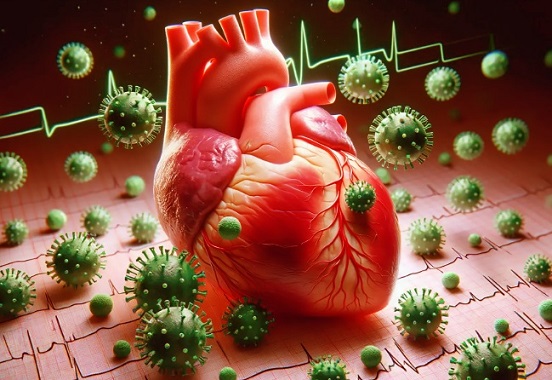Beyond Recovery, Study Reveals How COVID-19 Doubles Heart Attack and Stroke Risks for Years
Nikhil Prasad Fact checked by:Thailand Medical News Team Feb 25, 2025 1 month, 2 weeks, 6 days, 22 hours, 40 minutes ago
Medical News: The Lingering Threat of COVID-19 on the Heart
The COVID-19 pandemic may seem like a thing of the past for many, but new research suggests that the virus’s impact on the heart lingers long after recovery. A groundbreaking study conducted by researchers from the University Hospital Ulm, the University of Freiburg, Heidelberg University Hospital, Tuebingen University Hospital, and Ulm University in Germany has revealed alarming findings: individuals who have recovered from COVID-19 face a significantly increased risk of heart attacks and strokes, even years after their initial infection.
 Beyond Recovery, Study Reveals How COVID-19 Doubles Heart Attack and Stroke Risks for Years
Beyond Recovery, Study Reveals How COVID-19 Doubles Heart Attack and Stroke Risks for Years
While early research had already linked severe COVID-19 cases to heart problems, this latest study provides deeper insights into the long-term cardiovascular consequences, even for those who experienced mild or moderate infections. This
Medical News report delves into the details of these findings and what they mean for public health.
The Study: Unveiling the Hidden Dangers
The study, part of the ongoing EPILOC (Epidemiology of Long COVID) research project, examined 1,154 individuals - 679 who experienced post-COVID syndrome (PCS) and 475 fully recovered controls. Conducted approximately 1.5 years after infection, the study assessed participants’ heart structure and function using transthoracic echocardiography and cardiopulmonary exercise testing.
The results were concerning. Researchers found that post-COVID individuals exhibited significant impairments in left ventricular global longitudinal strain (LV GLS), which is an early marker of heart dysfunction. The study revealed that PCS patients had reduced LV GLS (-20.25% compared to -20.73% in controls), lower diastolic function, and decreased tricuspid annular plane systolic excursion (TAPSE), a marker of right ventricular function. Even after adjusting for factors like age, body mass index (BMI), blood pressure, and pre-existing heart conditions, these cardiovascular impairments remained consistent.
Heart Function Decline: A Silent Warning
One of the most striking findings was that subtle heart function declines persisted in PCS patients, despite their echocardiographic parameters remaining within normal ranges. Researchers found that these impairments correlated with reduced exercise capacity, as measured by maximum oxygen uptake (VO2max). Patients with lower LV GLS had significantly lower fitness levels, further supporting the theory that COVID-19 leaves a lasting mark on cardiovascular health.
Unlike previous studies that focused primarily on hospitalized patients, this study highlights that even non-hospitalized individuals can experience long-term heart complications. With 44% of PCS patients showing reduced LV GLS compared to 36.3% in recovered individuals, the findings suggest that a large portion of post-COVID patients may be at increased risk for future heart attacks and strokes.
How COVID-19 Impacts the Cardiovascular Syste
m
But what exactly is causing this lingering cardiovascular damage? The study suggests multiple mechanisms may be at play, including:
-Inflammation and Immune Overreaction: COVID-19 triggers widespread inflammation, which can damage blood vessels and the heart muscle itself. Elevated levels of inflammatory markers have been observed in PCS patients.
-Microvascular Dysfunction: Persistent dysfunction in small blood vessels may impair oxygen delivery to the heart, leading to chronic cardiovascular stress.
-Platelet Activation and Clotting Abnormalities: COVID-19 has been associated with increased blood clot formation, which can block arteries and heighten the risk of strokes and heart attacks.
-Endothelial Dysfunction: The virus can impair the inner lining of blood vessels, reducing their ability to expand and contract properly, thereby contributing to high blood pressure and heart disease.
Post-COVID Syndrome: More Than Just Fatigue
Post-COVID syndrome, often referred to as “long COVID,” is characterized by persistent symptoms lasting months to years after infection. Common complaints include fatigue, shortness of breath, chest pain, and rapid physical exhaustion (RPE). The study found that PCS patients reported significantly higher rates of chronic fatigue (71% vs. 0.8% in controls), wheezing (23% vs. 0%), and chest pain (25% vs. 2.1%).
Interestingly, researchers noted a direct correlation between reduced heart function and the presence of persistent symptoms. Individuals with lower LV GLS were more likely to report extreme exhaustion and exercise intolerance, further reinforcing the connection between post-COVID syndrome and cardiovascular complications.
The Implications: A Call for Long-Term Monitoring
These findings underscore the urgent need for long-term cardiovascular monitoring in individuals who have recovered from COVID-19. Healthcare providers should consider routine heart screenings, particularly for those who continue to experience fatigue, chest pain, or exercise intolerance.
For those who have had COVID-19, especially multiple times, experts recommend lifestyle adjustments to support heart health, including:
-Regular cardiovascular screenings: Even if you feel fine, a check-up with your doctor can detect hidden heart abnormalities.
-Healthy diet and exercise: A heart-healthy diet rich in fruits, vegetables, and lean proteins can reduce inflammation, while moderate exercise can help improve cardiovascular function.
-Monitoring blood pressure and cholesterol levels: Keeping these in check can mitigate some of the increased risks posed by COVID-19.
-Avoiding smoking and excessive alcohol consumption: Both can further damage blood vessels and increase heart attack risk.
Conclusion: The Need for Ongoing Research and Awareness
This study provides compelling evidence that COVID-19’s impact on the heart extends well beyond the acute infection phase. With persistent impairments in heart function and an increased risk of cardiovascular events, individuals recovering from COVID-19 should remain vigilant about their heart health.
While more research is needed to fully understand the long-term effects, one thing is clear - COVID-19 is not just a respiratory virus. Its influence on the cardiovascular system could have lasting consequences, making it essential for both individuals and healthcare systems to prepare for potential long-term complications.
The study findings were published in the peer-reviewed journal: Infection.
https://link.springer.com/article/10.1007/s15010-025-02481-4
For the latest COVID-19 News, keep on logging to Thailand
Medical News.
Read Also:
https://www.thailandmedical.news/news/covid-19-increases-the-risk-of-heart-attacks-through-interleukin-6
https://www.thailandmedical.news/news/medical-news-californian-study-shows-that-majority-of-sars-cov-2-induced-post-mis-c-children-have-long-term-heart-issues
https://www.thailandmedical.news/news/american-study-discovers-that-covid-19-alters-heart-glycosylation-leading-to-potential-cardiac-complications
https://www.thailandmedical.news/articles/coronavirus
https://www.thailandmedical.news/pages/thailand_doctors_listings
